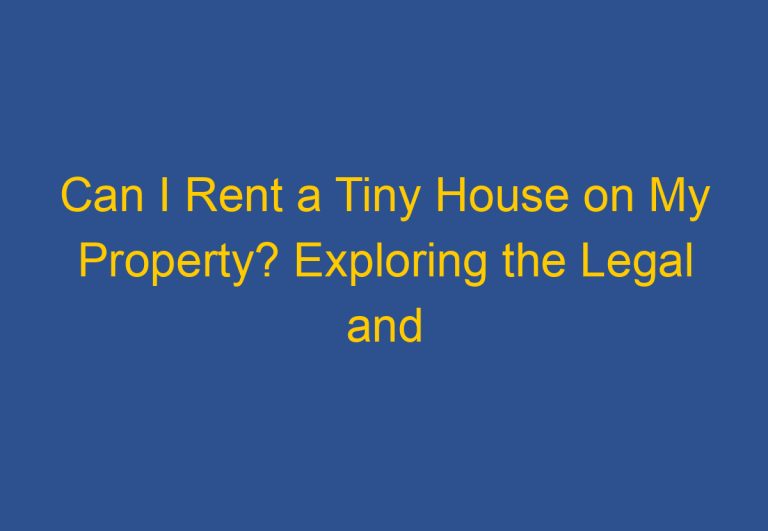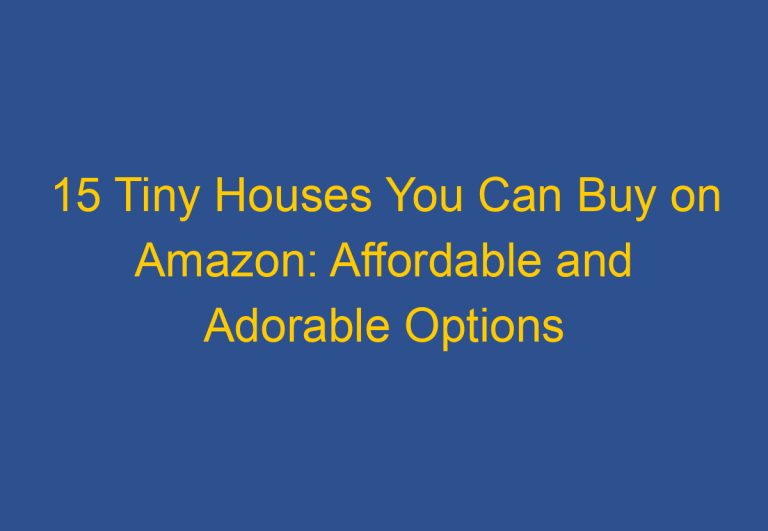What States Allow Tiny Houses: A Comprehensive Guide
Tiny houses have become a popular trend in the United States in recent years, with many people opting for this minimalist lifestyle. However, not all states have the same regulations when it comes to tiny houses. If you’re interested in joining the tiny house movement, it’s important to know which states allow tiny houses and what the regulations are in those states.
California is one of the most popular states for tiny house living, with most cities allowing the development of tiny homes. However, it’s important to check the rules, zoning laws, and building codes before building a tiny house in California, as regulations are regulated by the local jurisdictions in the state. Maine is another state with quite lenient regulations across the state for tiny homes, with anything under 400 square feet considered a tiny home. The cities of Austin and Spur in Texas are also good choices for tiny home living, with Austin allowing tiny houses of any size to be built and Spur offering free land for those who want to build a tiny house.
While tiny houses are not explicitly forbidden in any U.S. state, only a handful of states are considered “tiny house friendly.” These states tend to be those of a more eco-friendly persuasion or those where zoning laws and permits might be a bit more flexible in terms of building dwellings of this size. It’s important to do your research and understand the regulations in your state before embarking on your tiny house journey.
Legality and Zoning Regulations
State-Specific Regulations
When it comes to the legality of tiny houses, it is important to note that regulations vary from state to state. In California, for example, most cities allow the development of tiny homes, making it a popular destination for tiny home enthusiasts. Texas, on the other hand, has differing regulations from county to county, making it a little confusing for those looking to build a tiny home.
In Florida, tiny homes are considered RVs, which means they can only be parked in RV parks or on private property. In Oregon, tiny homes are allowed as long as they meet certain building codes and are built on a foundation. Arizona has no statewide regulations for tiny homes, but some cities have created their own regulations.
In Washington, tiny homes are allowed as ADUs (accessory dwelling units) as long as they meet certain building codes. North Carolina allows tiny homes as long as they meet building codes and are built on a foundation. Maine has lenient regulations for tiny homes, with anything under 400 square feet considered a tiny home.
Zoning Laws and Building Codes
Zoning laws and building codes are also important to consider when building a tiny home. Zoning laws may require tiny homes to be connected to public utilities like water, sewer, and electricity. However, some jurisdictions may allow off-grid living with alternative systems like solar panels, composting toilets, and rainwater collection.
Building codes also vary from state to state and may require certain safety features like smoke detectors and fire extinguishers. Some states, like Colorado, have adopted Appendix Q, which provides building standards specifically for tiny homes.
It is important to do thorough research on the zoning laws and building codes in the area where you plan to build your tiny home. It is also recommended to consult with a professional builder or architect to ensure that your tiny home meets all necessary regulations and codes.
Living in Tiny Houses
Living in a tiny house is a lifestyle that is gaining popularity in the United States. Tiny homes are small, compact houses that are often built on wheels, making them portable and easy to move from one location to another. They are a perfect solution for people who want to downsize, live a more minimalist lifestyle, or are looking for a more affordable housing option.
Lifestyle and Community
Living in a tiny house is more than just a housing choice, it is a lifestyle. It is a way of life that promotes simplicity, freedom, and a sense of community. Tiny house communities are popping up all over the country, providing a space for like-minded individuals to live and connect with each other. These communities often have shared amenities, such as gardens, laundry facilities, and community spaces.
Financial and Environmental Benefits
One of the biggest benefits of living in a tiny house is the financial savings. Tiny homes are much more affordable than traditional homes, and they require less maintenance and upkeep. They are also more environmentally friendly, as they use less energy and resources. Many tiny homes are built using sustainable materials and are designed to be energy-efficient.
When it comes to location, some states are more tiny house-friendly than others. According to HomeAdvisor, California, Oregon, and Texas are among the top 10 states for living in a tiny home. Other states, such as Maine and Georgia, have lenient regulations across the state for tiny homes.
Overall, living in a tiny house provides a sense of freedom, comfort, and simplicity. It is a great option for those who want to downsize, reduce their environmental impact, or live a more affordable lifestyle. While there are some challenges to living in a tiny house, such as safety concerns and bills, the benefits far outweigh the drawbacks. Whether you are looking to join a tiny house community or build your own tiny home, there are many resources available, including tiny house builders, RV parks, and wishbone tiny homes.
Frequently Asked Questions
Which states have the most lenient regulations for tiny house living?
Several states have lenient regulations for tiny house living. California, Texas, Colorado, Arizona, Florida, New Mexico, Oregon, North Carolina, Tennessee, and Georgia all have well-known and livable tiny house communities. Maine has quite lenient regulations across the state for tiny homes as well. Anything under 400 square feet is considered a tiny home in Maine. The cities of Austin and Spur in Texas are also good choices for tiny home living. Austin allows tiny houses of any size to be built as long as the building has a foundation.
Is it possible to legally reside in a tiny house on your own land?
It is possible to legally reside in a tiny house on your own land, but it depends on the zoning laws of the county you reside in. Zoning laws may require tiny homes to be connected to public utilities like water, sewer, and electricity. However, some jurisdictions may allow off-grid living with alternative systems like solar panels, composting toilets, and rainwater collection.
What are the zoning requirements for tiny homes in various counties?
Zoning requirements for tiny homes vary from county to county. Some counties allow tiny homes on wheels to be parked on private property as long as they meet certain requirements, while others require tiny homes to be built on a foundation and meet specific size and design standards. It’s important to research the zoning laws of the county you plan to reside in before building or purchasing a tiny home.
Do tiny houses on wheels have different legal considerations than stationary ones?
Yes, tiny houses on wheels have different legal considerations than stationary ones. In many states, tiny houses on wheels are classified as recreational vehicles and are subject to different regulations than permanent dwellings. However, there are some states that have updated their regulations to allow tiny houses on wheels to be used as permanent dwellings.
What permits are necessary for constructing a tiny house on private property?
The permits necessary for constructing a tiny house on private property vary depending on the county and state. In general, building permits, electrical permits, and plumbing permits are required for constructing a tiny house on private property. It’s important to check with the local building department to determine the specific permits required for your area.
Which states offer incentives or financial benefits for building tiny houses?
Some states offer incentives or financial benefits for building tiny houses. For example, the state of Colorado has a program that provides grants to individuals and organizations for building affordable housing, including tiny homes. Oregon has a tax incentive program for building energy-efficient homes, including tiny houses. It’s important to research the specific incentives and financial benefits available in your state before building a tiny home.










